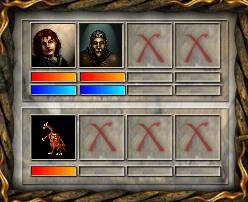 |
 |
Characters that are by themselves will always be the sole target of
every monster they encounter. However, the character can even
out the odds during combat by keeping monsters as companions: During combat,
the attacking monsters will split their
attention between the character and the companions. Also, having a group
of bloodthirsty monsters fighting for you can be helpful. When a
monster becomes a companion, it will fight for its master to the best of
its abilities, and if a companion kills a monster your character is quested
for, you will get full credit for the kill. Of course, it’s never wise
to rely too much on your companions: You won’t get nearly as much experience
for monsters killed by your companions as if you do the work yourself, and
if a powerful companion suddenly turns on you and attack when you’re badly
hurt, you may find yourself in serious trouble. Also, if two
or more characters form a party and each have their own companions, quite
often the companions can become disoriented during battle and attack a
party member!
 The companions for the selected character are shown in the lower half of the Party window, located in the lower left corner of the main screen window. If you hold your mouse over a companion’s picture, its Name, Hit Points and Bind Level will be displayed. For more information, right-click on the companion and select Info. There are three different ways to aquire a companion. Sometimes, a monster encountered in the dungeon will offer to join you, but only monsters that are significantly weaker than your character(s) are likely to do so. Companions can also be purchased from the Confinement in the city, which is a convenient way for beginning characters to get some extra help. However, if you desire a powerful companion, you will usually have to use a Charm spell, which Binds a monster against its will to serve the character. Only the Magi learn Charm spells from their Spellbooks; other characters will have to rely on items that cast these spells when used. Charming
& Binding Companions
Not only do more powerful monsters require stronger bonds to keep them under control; the stronger the monster is relative to the character, the easier it will break free. It is almost impossible for low level characters to regulate high level monsters, even with the most powerful spells; the true power of companion regulation comes with experience and guild levels. Increasing Bind Levels
The Bind Level inflicted on a companion during refortification depends on which spell is used and at which level the spell is cast, as does the initial Bind Level when a character Charms a monster. Voluntary Companions
Since voluntary companions have no magical bond, the ordinary Bind spells will not work on them. However, the Bind service in the Confinement store is capable of imposing bonds on voluntary companions (“converting” them), but this is very expensive. Combat
& Companions
The more bodies there are in combat, the higher the risk that another party member (and their companions) will be mistaken for the enemy. It’s recommended that the total ‘body’ count for an adventuring group never exceeds 6. Any player who organizes a party of four characters with each character having four companions is going to have a really bad day - especially if some of the companions can cast high level spells or can stone their targets!! Handling
Companions
Regulating companions & dealing with surprise attacks
It is strongly recommended that a character does not take on a companion that is significantly more powerful than themselves, since there is always the slight possibility that the companion could break free of their bond and surprise attack the character and/or the party. You can also attack a companion: Right-click on the companion’s picture and select Attack! If you want to get rid of a companion while in the dungeon, right-click on the companion’s picture and select Kick Out. If you kick out a Bound companion, it may choose to attack you, but most will leave peacefully. Companions cannot be traded between characters. Naming your Companions
Learning about your Companions
It’s a good idea to fully identify companions for the same reason it is to ID items. You will be able to learn everything about them that you can, and read some general information (and knowledge) about them, which can sometimes prove to be invaluable (or at least humorous). There are only two ways to get a completely identified monster in the library: You must either have it as a companion and study it, or take the creature to the Confinement store and have them identify it for you. Healing & Resurrecting your Companions
Whenever a companion dies, you will automatically carry them - if they can be carried (ever tried to carry a giant?). In order to pick up another character, you must drop any companion you might be carrying. If a companion dies and you are already carrying one, the companion with the most hits will be carried. A character will never drop a character to carry a dead companion. If a dead companion gets dropped (or wasn’t carried in the first place), it’s gone forever. Moving & Reorganizing your Companions
Selling your Companions
|